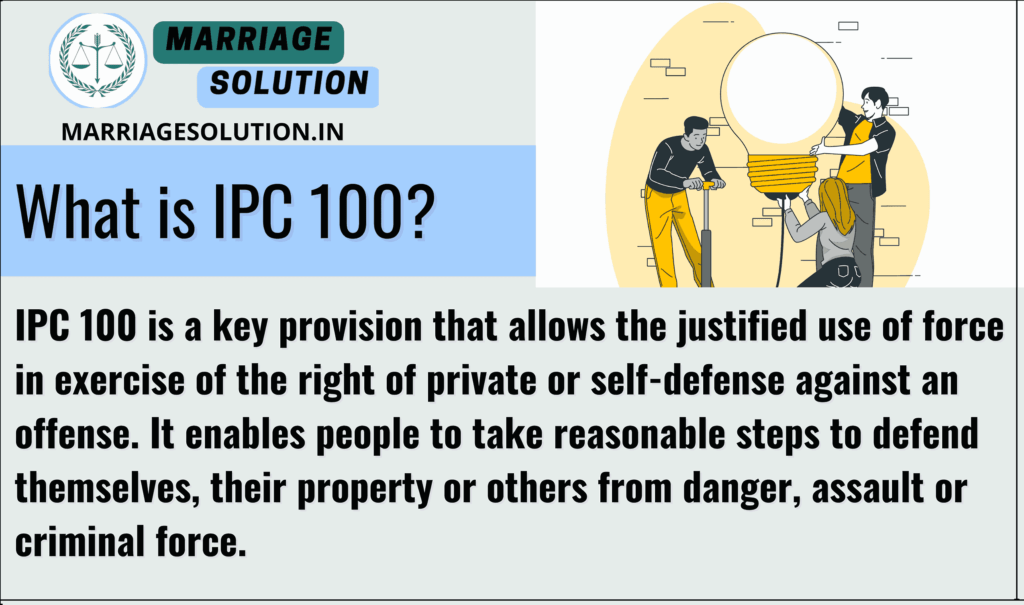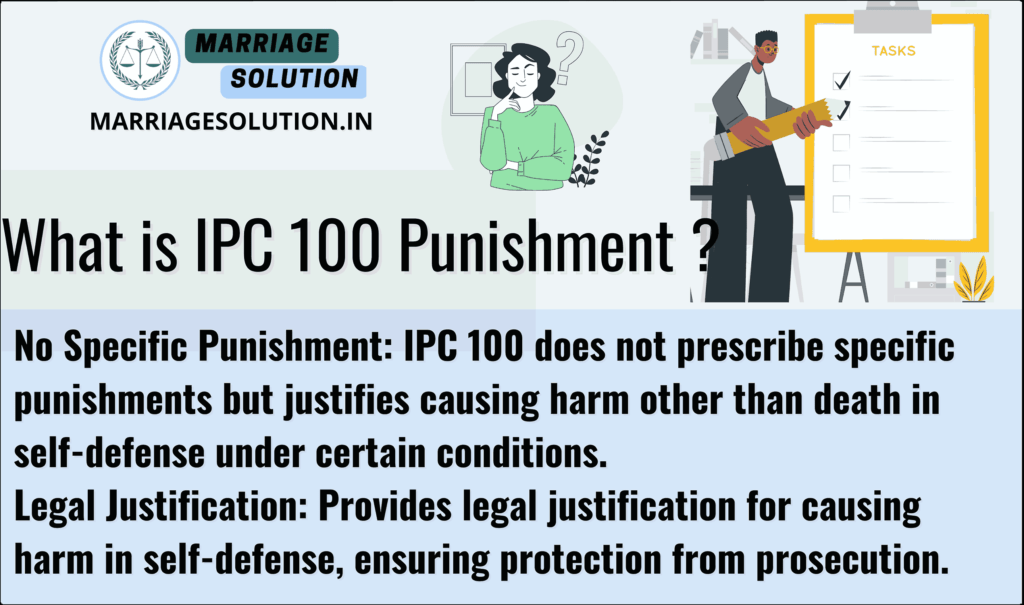Introduction of IPC 100
IPC Section 100 deals with the legal right of private defense of body, property and others. It specifies the circumstances under which a person can use reasonable force to protect themselves, their property or defend others from harm or assault.
- Introduction of IPC 100
- What is IPC Section 100 ?
- IPC Section 100 Overview
- IPC 100 Punishment
- 100 IPC bailable or not ?
- Section 100 IPC case laws
- Section 100 IPC in short information
- IPC 100 FAQs
- If you need support with court proceedings or any other legal matters, don’t hesitate to reach out for assistance.
What is IPC Section 100 ?
IPC 100 is a key provision that allows the justified use of force in exercise of the right of private or self-defense against an offense. It enables people to take reasonable steps to defend themselves, their property or others from danger, assault or criminal force.

IPC Section 100 Overview
IPC Section 100 specifies the situations where the right of private defense extends to causing death. These situations include assaults that pose a risk of death, serious injury, rape, kidnapping, abduction, and unnatral offenses. The section ensures that individuals can defend themselves against extreme threats to their safety and dignity.
Key Points of IPC Section 100
- Introduction to IPC Section 100 IPC Section 100 allows the right of private defense of the body to extend to causing death under certain circumstances. It ensures individuals can protect themselves from grave and imminent danger.
- Protection Against Deadly Assaults The section permits causing death in self-defense if the assault involves the risk of death. This ensures that individuals can defend themselves against life-threatening attacks.
- Defense Against Serious Harm It includes defense against assault that could cause serious injury. This provision ensures individuals can protect themselves from severe bodily harm.
- Protection Against Kidnapping and Abduction The right extends to defending against acts of kidnapping or abduction, providing a legal safeguard against such grave offenses.
- Defense Against Rape IPC Section 100 allows the use of force, including causing death, to prevent rape. This ensures the protection of one’s dignity and bodily integrity.
- Protection Against Unnatural Offenses The section includes the right to defend against unnatural offenses, providing a broad scope of protection for bodily integrity.
IPC 100 Punishment
No Specific Punishment: IPC 100 does not prescribe specific punishments but justifies the use of lethal force in self-defense under specified circumstances.
Legal Justification: It provides legal justification for causing death in self-defense, ensuring protection from prosecution.
Specific Conditions: The justification applies only under specific conditions like threat of death, serious injury, rape, kidnapping, abduction, or unnatural offenses.

100 IPC bailable or not ?
Cases invoking the right of private defense under IPC 100 do not constitute an offense in themselves. Hence, the question of bail does not apply since no crime has been committed if the action falls under the purview of this provision.
Section 100 IPC case laws
Section 100 of IPC: Right of Private Defence of the Body
1. K.M. Nanavati v. State of Maharashtra (1962)
- Facts: Naval Officer K.M. Nanavati shot and killed his wife’s lover, Ahuja.
- Issue: Whether Nanavati’s act was in private defense.
- Judgment: The Supreme Court held that the act was not in private defense.
- Rationale: There was no immediate threat to Nanavati’s life; hence, the killing was not justified under IPC Section 100.
- Significance: Clarified that immediate and real threat is necessary for claiming the right of private defense.
2. Biran Singh v. State of Bihar (1975)
- Facts: Biran Singh killed an individual who attacked him with a knife.
- Issue: Whether the killing was justified under private defense.
- Judgment: The court ruled in favor of Biran Singh.
- Rationale: The attacker posed an imminent threat to Singh’s life, justifying the act under IPC 100.
- Significance: Demonstrated that lethal force is permissible when facing an immediate life-threatening assault.
3. Darshan Singh v. State of Punjab (2010)
- Facts: Darshan Singh killed his neighbor who attempted to forcibly enter his house with a weapon.
- Issue: Whether Singh’s action was justified under private defense.
- Judgment: The Supreme Court acquitted Singh.
- Rationale: The intruder posed a serious threat, and Singh’s response was within the right of private defense.
- Significance: Reinforced that individuals can defend their homes against armed intruders.
4. Sikandar Singh v. State of Bihar (2010)
- Facts: Sikandar Singh and his associates were attacked by a group, resulting in Singh killing one of the attackers.
- Issue: Whether the killing was an act of private defense.
- Judgment: The Supreme Court upheld Singh’s claim of private defense.
- Rationale: The group posed an imminent threat to Singh’s life.
- Significance: Established that self-defense can be claimed against group attacks posing severe threats.
5. Ravi Kumar v. State of Karnataka (1999)
- Facts: Ravi Kumar killed an intruder who entered his house at night.
- Issue: Whether Kumar’s act was justified under private defense.
- Judgment: The court acquitted Kumar.
- Rationale: The intruder’s nocturnal entry and aggressive behavior justified lethal force under IPC 100.
- Significance: Highlighted that night-time intrusions can justify lethal self-defense.
6. Surinder Pal v. State of Haryana (2003)
- Facts: Surinder Pal killed an armed assailant who tried to rob him.
- Issue: Whether the killing was an act of private defense.
- Judgment: The court ruled in favor of Surinder Pal.
- Rationale: The armed robbery attempt posed a severe threat to Pal’s life.
- Significance: Affirmed the right to use lethal force against armed robbery attempts.
7. State of Gujarat v. Bai Fatima (1975)
- Facts: Bai Fatima killed an individual attempting to molest her.
- Issue: Whether the killing was justified under private defense.
- Judgment: The court acquitted Bai Fatima.
- Rationale: The attempt to molest constituted a severe threat to her dignity and safety.
- Significance: Validated the use of lethal force to prevent molestation under IPC 100.
8. Laxman v. State of Maharashtra (2004)
- Facts: Laxman killed a person who tried to kidnap his daughter.
- Issue: Whether the act was justified under private defense.
- Judgment: The court ruled in favor of Laxman.
- Rationale: The attempted kidnapping posed a grave threat to his daughter’s safety.
- Significance: Confirmed the right to use lethal force to prevent kidnapping.
9. State of Punjab v. Rakesh Kumar (1995)
- Facts: Rakesh Kumar killed a person who attempted to rape his sister.
- Issue: Whether Kumar’s act was justified under private defense.
- Judgment: The court acquitted Rakesh Kumar.
- Rationale: The attempted rape posed an immediate and severe threat.
- Significance: Reinforced the right to use lethal force to prevent rape.
10. Moti Singh v. State of Uttar Pradesh (1986)
- Facts: Moti Singh killed an individual who attacked him with an iron rod.
- Issue: Whether Singh’s act was justified under private defense.
- Judgment: The court ruled in favor of Moti Singh.
- Rationale: The attacker’s use of a deadly weapon posed an imminent threat to Singh’s life.
- Significance: Highlighted that the use of lethal force is justified against deadly weapon assaults.
Section 100 IPC in short information
| Offence | Definition | Punishment | Bailable or Not |
|---|---|---|---|
| Right of Private Defense | Right to cause death in self-defense under threat of death, serious injury, rape, kidnapping, abduction, or unnatural offenses. | No specific punishment | Not applicable (provision for self-defense justification) |
IPC 100 FAQs
What is IPC Section 100?
IPC Section 100 outlines the right to cause death in self-defense under certain severe conditions, such as threats of death, serious injury, rape, kidnapping, abduction, and unnatural offenses.
Can I use lethal force to protect myself under IPC 100?
Yes, IPC 100 allows the use of lethal force in self-defense if you are facing a grave threat like risk of death, serious injury, or any of the specified severe offenses.
Does IPC 100 provide specific punishments?
No, IPC 100 does not prescribe punishments but provides legal justification for causing death in self-defense under specified circumstances.
Is the use of force under IPC 100 always justified?
The use of force must be proportionate to the threat and can only be justified under the specific conditions outlined in IPC 100.
Why are there specific conditions under IPC 100?
The conditions ensure that the right to self-defense is not misused and that lethal force is only used in the most extreme and justifiable situations.
If you need support with court proceedings or any other legal matters, don’t hesitate to reach out for assistance.
Court or any other marriage-related issues, our https://marriagesolution.in/lawyer-help-1/ website may prove helpful. By completing our enquiry form and submitting it online, we can provide customized guidance to navigate through the process effectively. Don’t hesitate to contact us for personalized solutions; we are here to assist you whenever necessary!
